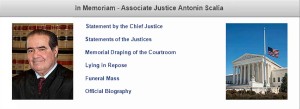Justice Scalia’s unexpected death leaves a huge void on the Supreme Court and he will be missed by liberals and conservatives alike for his brilliant mind and uncommon humor. Others may not miss him as much for his biting dissents and personal invective against some of his colleagues on the court. Regardless of whether you agreed or not with his opinions–and I confess that I did not subscribe to his conservative judicial views–the Court and the country lost a judicial icon. This blog post recalls a special lunch I had many years ago with Justice Scalia.
For several years, I worked on international legal development projects. These projects were devoted to build the rule of law in various foreign countries where rule of law was not part of the landscape. My primary beat was the states that emerged from the ashes of the Soviet Union.
One of the major themes of the projects on which I worked was to support the independence of the judiciary and I had the honor of working with many devoted state and federal court judges here in the United States who gave of their time and energy to foster relationships with their counterparts in foreign lands where judicial independence was an illusory goal.
The personal and professional contacts that these U.S. judges forged with their counterparts in foreign countries made an indelible mark on the success of these programs. Judges can sometimes find common language with other judges, regardless of their nationality, political persuasion, age or background. One of the judges whom I met through these programs was Justice Scalia. He had developed a friendship with judges from the Supreme Court of Armenia when he visited Armenia in 1995, just a few years after Armenia became independent. Yerevan in those days was running on generators, and just barely. There were no ATMs in Yerevan and the theater was one of the most popular places in town because it was one of the few public buildings with heat.
Several years later, with funding support from the United States Agency for International Development (USAID), a delegation of Armenian judges, including those who had previously met Justice Scalia in Armenia, traveled to Washington, D.C. to meet U.S. judges and court administrators. The idea was that they would observe the workings of courts in the United States and take home with them some of the tools that they learned. When Justice Scalia got wind that these judges were in town, he invited a couple of them and me to lunch at his favorite lunch place, A.V. Ristorante Italiano, a not so elegant Italian restaurant. The restaurant was a close drive from the Supreme Court building and reportedly had some of the best pizza in town.
We were joined by a couple of judges from the U.S. Circuit Court of Appeals for the Federal Circuit and Court of Federal Claims. We were quickly ushered into a back room. It was clear that Justice Scalia was a regular and we were seated around an informal table.
Justice Scalia lived up to his reputation, holding forth over our pizza lunch and railing against those who disagreed with him. In discussing cases on the Court’s docket, he usually started out his sentences with “Can you believe that [my fellow justices would disagree with my views]”? That was his way and I was surprised by his candor about significant cases still pending before the Court–not that it was any secret about which way he was going to vote, just surprised by how unguarded he seemed in his remarks on decisions that had not yet been announced.
Justice Scalia thought that our embrace of the rule of law and particularly the independence of the judiciary should influence the development of courts in foreign countries. As much as he thought that foreign courts may want to look at the example of judicial independence in the U.S., he was as ardent in his belief that foreign law should have no place in influencing U.S. law, particularly constitutional law. A citation in a U.S. court opinion to foreign law even in a footnote was anathema to him.
Justice Scalia had a long-lived debate with fellow Justice Breyer about the relevance of foreign law norms both on and off the court. Here is just a snippet of Justice Scalia’s views in a debate at American University in 2005.
But we don’t have the same moral and legal framework as the rest of the world, and never have. If you told the framers of the Constitution that we’re after is to, you know, do something that will be just like Europe, they would have been appalled. And if you read the Federalist Papers, it’s full of, you know, statements that make very clear they didn’t have a whole lot of respect for many of the rules in European countries. Madison, for example, says — speaks contemptuously of the countries on continental Europe, quote, “who are afraid to let their people bear arms,” closed quote.
…
[W]hat does the opinion of a wise Zimbabwe judge or a wise member of the House of Lords law committee, what does that have to do with what Americans believe, unless you really think it’s been given to YOU to make this moral judgment, a very difficult moral judgment?
You get the idea that he was a ferocious defender of judicial isolationism in the sense that he didn’t want foreign law to contaminate constitutional principles in the United States. Agree with him or not, a lunch with Justice Scalia especially over pizza to discuss judicial independence and foreign law was a great privilege.

